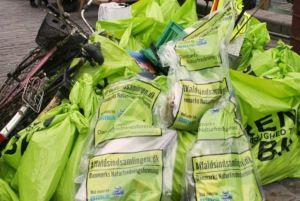News
155 tonnes of rubbish collected from Danish nature
This article is more than 8 years old.
Thousands of cans, a bible, cannabis and a dildo among the items collected

Tip of the trash-berg (photo: Freya Kamille Nielsen – Danmarks Naturfredningsforening)
On April 2 over 160,000 Danes participated in the annual spring cleaning day of Denmark’s nature organised by the Danish society for nature conservation, Naturfredningsforening.
The day yielded 154,975 kilos of trash from the nature, including over 100,000 cans, a bag of two kilos of cannabis, a bible, a set of dentures, a drone and a pink dildo.
“We hope to find as little as possible. We would prefer not to see any rubbish in the nature,” Ole Laursen, who is in charge of organising the annual trash collection day for Naturfredningsforening, told Metroxpress newspaper.
“We’ve had more people participating this year in the clean-up than ever before, but we’ve collected less trash. So that indicates that the Danes have become better at clearing up after themselves, which is fantastic news.”
READ MORE: Huge spike in trash at Copenhagen’s Lakes
Can of worms
But despite the amount of trash being less than the 181 tonnes collected last year, Laursen was concerned at the number of cans that came from abroad that were found.
Among the 107,660 cans collected, the vast majority (82,910) were cans that couldn’t be disposed using Denmark’s pant refund system.
“It takes the nature 500 years to break down a can, but it’s not just about the nature that the pant-free cans are a problem.” said Laursen.
“For instance, 88 new cans can be produced by 100 old ones and 95 percent less energy is used to smelt an old can into a new one.”
Instead, Laursen contends that a significant step to solving the issue is to put pant on all the cans the Danes bring home from the border shops in Germany.
Over the years, a number of odd items have been discovered on rubbish collection day, including safes, porno films, fake rubber buttocks, weapons, a piano, a chrysanthemum bomb, a pair of wax feet, a message in a bottle from a German looking for love, a postcard from Hawaii, Georg Jensen candles holders, part of a residence permit for a man from Afghanistan, and a murdered man in a forest (found by boy scouts).










































